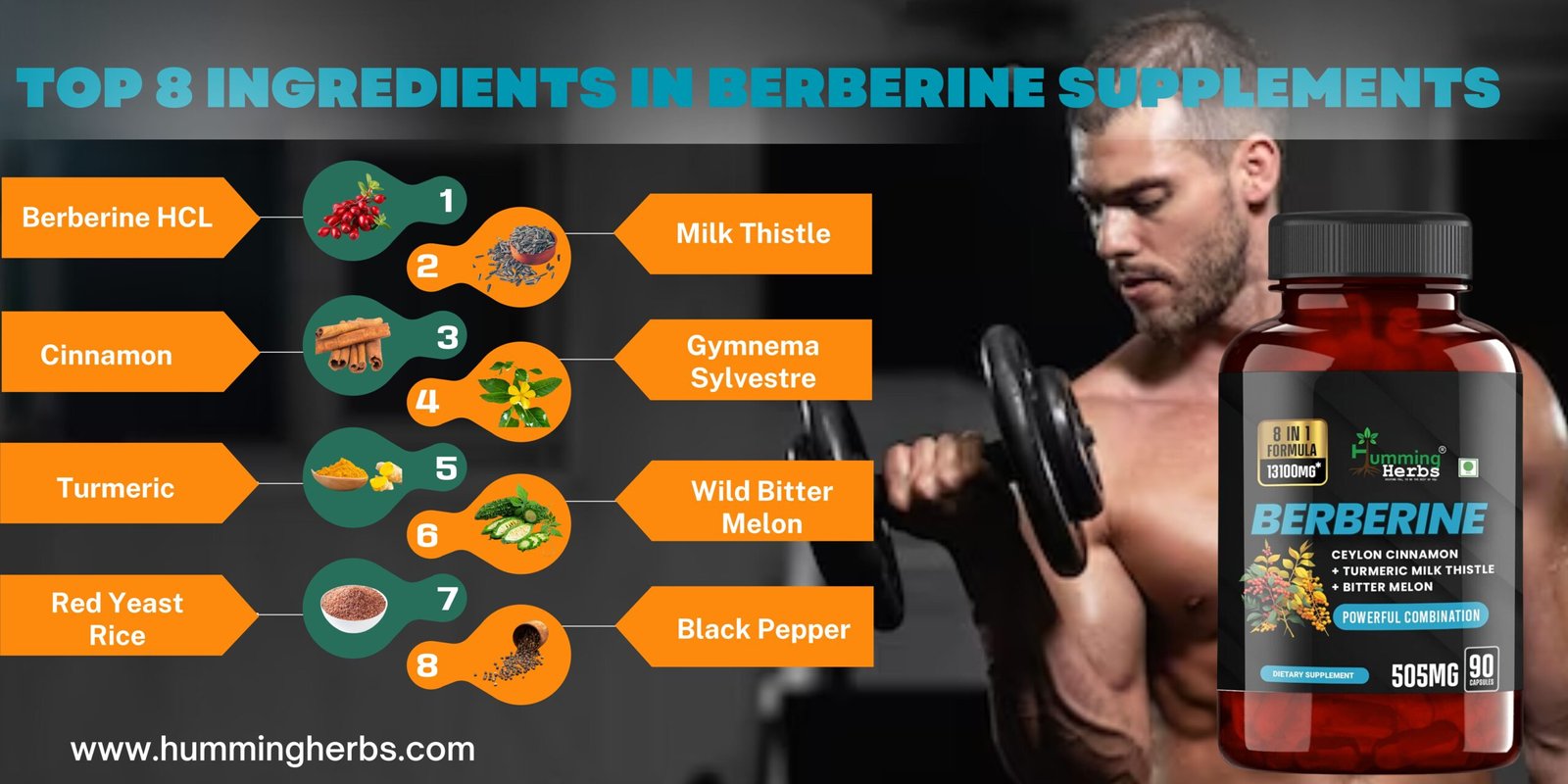- Your cart is empty
- Continue shopping

Berberine Supplements, a natural compound found in several plants, has gained significant attention in recent years due to its potential health benefits. It is often used as a dietary supplement to support various health conditions, including diabetes, high blood pressure, and high cholesterol.
While berberine can be extracted from various plants, it is commonly sourced from barberry, goldenseal, and Oregon grape. Its unique properties have made it a staple in traditional Chinese medicine for centuries, and modern research is now validating its efficacy.
To enhance the effectiveness of berberine supplements, many manufacturers combine it with other beneficial ingredients. These synergistic combinations can provide additional health benefits and address a wider range of concerns.
In this comprehensive guide, we will explore the top 8 ingredients commonly found in berberine supplements, delving into their benefits, uses, and potential interactions.

Ingredients in Berberine Supplements
1. Berberine HCL
Berberine HCL, the hydrochloride salt form of berberine, is the most common form found in supplements. It is highly bioavailable, meaning it is readily absorbed by the body and can exert its effects effectively. Berberine HCL has been extensively studied for its potential benefits in managing blood sugar levels, improving cholesterol profiles, and supporting cardiovascular health.
Benefits of berberine HCL may include:
- Blood Sugar Control: Berberine has shown promise in regulating blood sugar levels, particularly in individuals with type 2 diabetes. It may enhance insulin sensitivity and improve glucose uptake by cells.
- Cholesterol Management: Berberine may help lower LDL (bad) cholesterol and triglyceride levels while increasing HDL (good) cholesterol. This can improve overall cardiovascular health.
- Anti-inflammatory Effects: Berberine possesses anti-inflammatory properties that may reduce inflammation associated with various conditions, including arthritis and inflammatory bowel disease.
- Metabolic Health: Berberine may promote metabolic health by regulating appetite, reducing fat storage, and enhancing energy expenditure.
2. Milk Thistle
Milk thistle, a flowering plant native to Europe, is renowned for its liver-protective properties. It contains silymarin, a group of active compounds that exhibit antioxidant and anti-inflammatory effects. Milk thistle is often combined with berberine in supplements to support liver function, particularly in individuals with conditions like non-alcoholic fatty liver disease (NAFLD).
Benefits of milk thistle may include:
- Liver Protection: Milk thistle may protect the liver from various toxins, including alcohol and environmental pollutants. It may also help regenerate damaged liver cells.
- Improved Liver Function: Milk thistle may enhance liver function by reducing inflammation and promoting bile production, which aids in fat digestion and nutrient absorption.
- Antioxidant Protection: Milk thistle’s silymarin content provides potent antioxidant protection, scavenging harmful free radicals that can damage cells.
3. Cinnamon
Cinnamon, a spice derived from the inner bark of cinnamon trees, is a popular culinary ingredient with a wealth of potential health benefits. It contains polyphenolic compounds that exhibit antioxidant and anti-inflammatory properties. Cinnamon is often added to berberine supplements to support blood sugar control, improve insulin sensitivity, and enhance cardiovascular health.
Benefits of cinnamon may include:
- Blood Sugar Control: Cinnamon may help regulate blood sugar levels by slowing down carbohydrate absorption and enhancing insulin sensitivity.
- Improved Heart Health: Cinnamon may promote cardiovascular health by lowering LDL cholesterol, reducing blood pressure, and decreasing inflammation.
- Antidiabetic Properties: Cinnamon may have antidiabetic properties, potentially improving insulin sensitivity and reducing the risk of type 2 diabetes.
4. Turmeric
Turmeric, a vibrant yellow spice derived from the rhizomes of the Curcuma longa plant, is widely recognized for its anti-inflammatory properties. It contains curcumin, a bioactive compound that has been extensively studied for its potential benefits in managing a range of chronic conditions, including arthritis, Alzheimer’s disease, and certain types of cancer. Turmeric is often combined with berberine in supplements to enhance its anti-inflammatory and antioxidant effects.
Benefits of turmeric may include:
- Anti-inflammatory Effects: Turmeric’s curcumin possesses powerful anti-inflammatory properties, potentially reducing inflammation associated with various conditions, including arthritis and heart disease.
- Antioxidant Protection: Curcumin’s antioxidant activity neutralizes harmful free radicals, protecting cells from damage and reducing oxidative stress.
- Neuroprotective Effects: Turmeric may have neuroprotective effects, potentially reducing the risk of Alzheimer’s disease and other neurodegenerative conditions.
5. Gymnema Sylvestre
Gymnema sylvestre, a climbing woody vine native to tropical forests, has a long history of use in traditional Ayurvedic medicine for managing diabetes. It contains gymnemic acids, compounds that have been shown to suppress sugar cravings, reduce glucose absorption, and enhance insulin secretion. Gymnema sylvestre is often added to berberine supplements to synergistically support blood sugar control and diabetes management.
Benefits of gymnema sylvestre may include:
- Blood Sugar Control: Gymnema sylvestre may help regulate blood sugar levels by enhancing insulin sensitivity and reducing sugar absorption.
- Appetite Control: Gymnema sylvestre may suppress appetite and reduce sugar cravings, potentially aiding in weight management.
- Diabetes Management: Gymnema sylvestre may have potential benefits for diabetes management, potentially reducing the need for medication.
6. Wild Bitter Melon
Wild bitter melon, also known as Momordica charantia, is a tropical vine with a long history of use in traditional medicine for various health conditions, including diabetes and obesity. It contains compounds that have been shown to lower blood sugar levels, increase insulin sensitivity, and promote fat loss. Wild bitter melon is often included in berberine supplements to enhance its effects on blood sugar regulation and weight management.
Benefits of wild bitter melon may include:
- Blood Sugar Control: Wild bitter melon contains compounds that may help regulate blood sugar levels by increasing insulin secretion and improving glucose uptake by cells.
- Weight Management: Wild bitter melon may aid in weight loss by reducing appetite, increasing fat burning, and suppressing cravings for carbohydrates and sugars.
- Antibacterial Properties: Wild bitter melon possesses antibacterial properties that may help fight infections caused by bacteria.
7. Red Yeast Rice
Red yeast rice, a fermented product of red rice inoculated with Monascus purpureus, is a natural source of monacolin K, a compound structurally similar to lovastatin, a cholesterol-lowering medication. Red yeast rice is often combined with berberine in supplements to support cholesterol management and cardiovascular health.
Benefits of red yeast rice may include:
- Cholesterol Management: Red yeast rice may help lower LDL (bad) cholesterol and triglyceride levels while increasing HDL (good) cholesterol.
- Heart Health Improvement: Red yeast rice may contribute to improved cardiovascular health by reducing cholesterol levels and promoting heart function.
- Antioxidant Protection: Red yeast rice contains antioxidants that may protect cells from damage caused by free radicals.
8. Probiotics
Probiotics, live microorganisms that confer health benefits when consumed, are often added to berberine supplements to support gut health and overall well-being. Probiotics can help restore the balance of gut bacteria, improve nutrient absorption, and enhance immune function.
Benefits of probiotics may include:
- Enhanced Digestive Health: Probiotics can help maintain a healthy balance of gut bacteria, promoting digestion and nutrient absorption.
- Strengthened Immune System: Probiotics may support immune function by enhancing the production of immune cells and protecting against infections.
- Reduced Inflammation: Probiotics may help reduce inflammation throughout the body, potentially contributing to overall health and well-being.
Conclusion Berberine Supplements
Berberine, when combined with these complementary ingredients, offers a comprehensive approach to supporting various aspects of health and well-being. It is essential to consult with a healthcare professional before incorporating berberine supplements into your regimen, especially if you have any underlying health conditions or are taking medications.
Remember, these ingredients are not a substitute for a healthy lifestyle, which includes a balanced diet, regular exercise, and adequate sleep.
